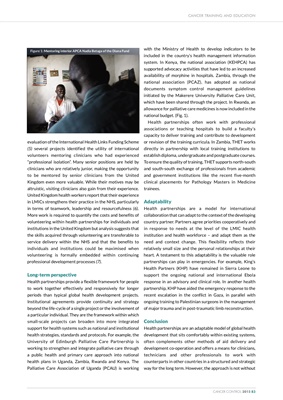
CANCER TRAINING AND EDUCATION
CANCER CONTROL 2015 83
evaluation of the International Health Links Funding Scheme
(5) several projects identified the utility of international
volunteers mentoring clinicians who had experienced
"professional isolation". Many senior positions are held by
clinicians who are relatively junior, making the opportunity
to be mentored by senior clinicians from the United
Kingdom even more valuable. While their motives may be
altruistic, visiting clinicians also gain from their experience.
United Kingdom health workers report that their experience
in LMICs strengthens their practice in the NHS, particularly
in terms of teamwork, leadership and resourcefulness (6).
More work is required to quantify the costs and benefits of
volunteering within health partnerships for individuals and
institutions in the United Kingdom but analysis suggests that
the skills acquired through volunteering are transferable to
service delivery within the NHS and that the benefits to
individuals and institutions could be maximised when
volunteering is formally embedded within continuing
professional development processes (7).
Long-term perspective
Health partnerships provide a flexible framework for people
to work together effectively and responsively for longer
periods than typical global health development projects.
Institutional agreements provide continuity and strategy
beyond the life-cycle of a single project or the involvement of
a particular individual. They are the framework within which
small-scale projects can broaden into more integrated
support for health systems such as national and institutional
health strategies, standards and protocols. For example, the
University of Edinburgh Palliative Care Partnership is
working to strengthen and integrate palliative care through
a public health and primary care approach into national
health plans in Uganda, Zambia, Rwanda and Kenya. The
Palliative Care Association of Uganda (PCAU) is working
with the Ministry of Health to develop indicators to be
included in the country's health management information
system. In Kenya, the national association (KEHPCA) has
supported advocacy activities that have led to an increased
availability of morphine in hospitals. Zambia, through the
national association (PCAZ), has adopted as national
documents symptom control management guidelines
initiated by the Makerere University Palliative Care Unit,
which have been shared through the project. In Rwanda, an
allowance for palliative care medicines is now included in the
national budget. (Fig. 1).
Health partnerships often work with professional
associations or teaching hospitals to build a faculty's
capacity to deliver training and contribute to development
or revision of the training curricula. In Zambia, THET works
directly in partnership with local training institutions to
establish diploma, undergraduate and postgraduate courses.
To ensure the quality of training, THET supports north-south
and south-south exchange of professionals from academic
and government institutions like the recent five-month
clinical placements for Pathology Masters in Medicine
trainees.
Adaptability
Health partnerships are a model for international
collaboration that can adapt to the context of the developing
country partner. Partners agree priorities cooperatively and
in response to needs at the level of the LMIC health
institution and health workforce - and adapt them as the
need and context change. This flexibility reflects their
relatively small size and the personal relationships at their
heart. A testament to this adaptability is the valuable role
partnerships can play in emergencies. For example, King's
Health Partners (KHP) have remained in Sierra Leone to
support the ongoing national and international Ebola
response in an advisory and clinical role. In another health
partnership, KHP have aided the emergency response to the
recent escalation in the conflict in Gaza, in parallel with
ongoing training to Palestinian surgeons in the management
of major trauma and in post-traumatic limb reconstruction.
Conclusion
Health partnerships are an adaptable model of global health
development that sits comfortably within existing systems,
often complements other methods of aid delivery and
development co-operation and offers a means for clinicians,
technicians and other professionals to work with
counterparts in other countries in a structured and strategic
way for the long term. However, the approach is not without
Figure 1: Mentoring interior APCA Nadia Betaga of the Diana Fund